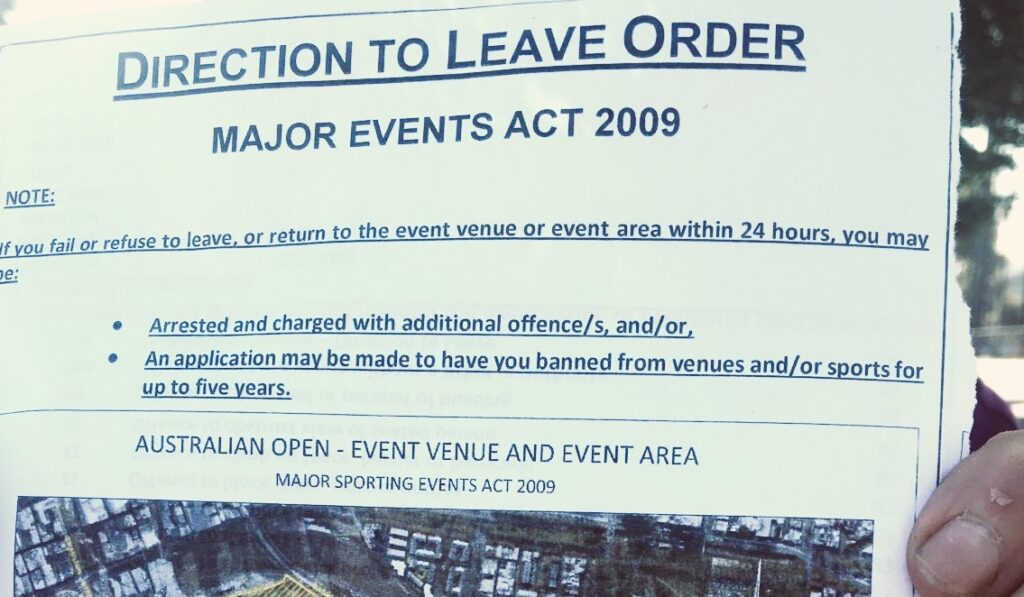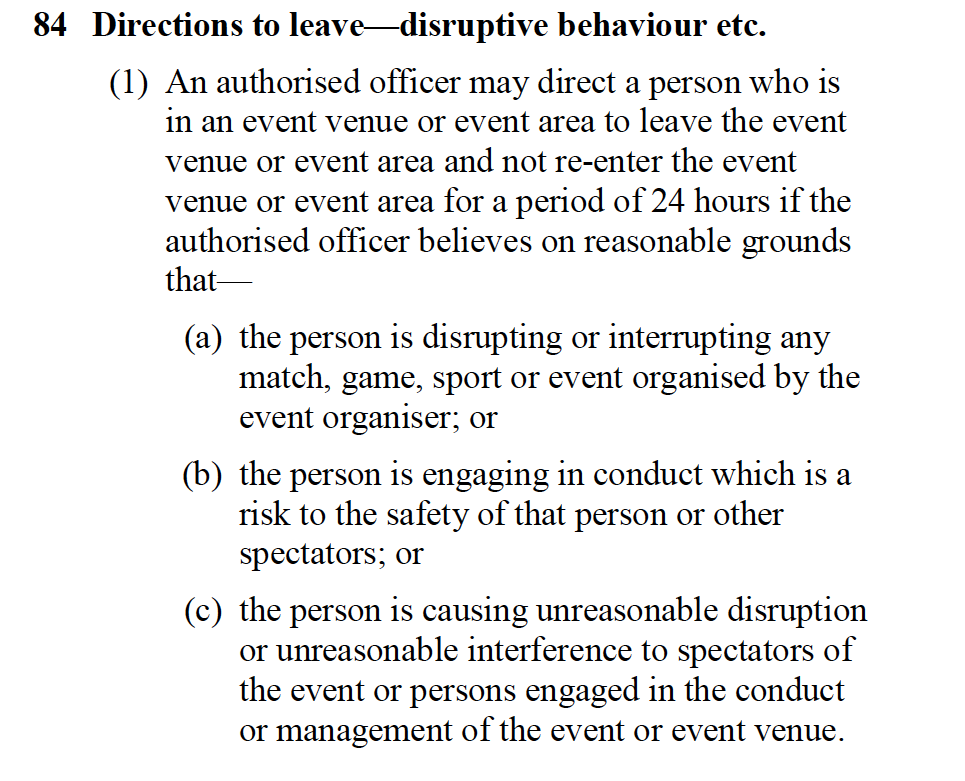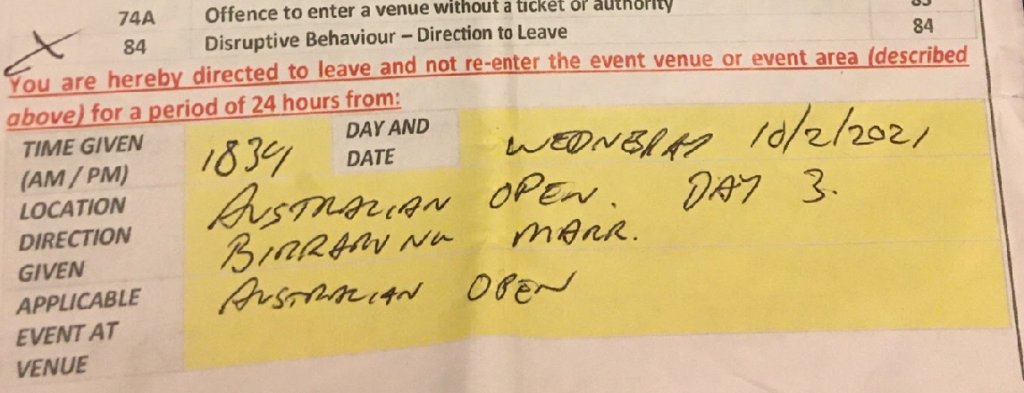
Melbourne Activist Legal Support
In the past week, police have been threatening a small group of refugee protesters, including members of Grandmothers for Refugees, with arrest and issuing them with ‘Directions to Leave’. Three members of the protest group have been issued banning orders for 24 hours.
We believe that these actions by police are outside the scope of the powers provided by the Major Events Act 2009 (Vic) and therefore unreasonably and disproportionately restrict the right to peaceful assembly and political expression enshrined in Victoria’s Charter for Human Rights and Responsibilities 2006.

Background and Analysis
Protesters were initially informed by police on Monday 8 February that while they could engage in protest in a particular location, they could not, chant, hand out leaflets, or even ‘engage with passers by’. Later, this changed and other officers issued ‘Directions To Leave’ to several protesters, threatening protesters with arrest unless they moved to a location outside a zone designated under the Major Events Act 2009 (Vic) (the Act). See Statement by Protester below.
The Major Events Act 2009 (the Act) provides Authorised Officers including police with powers to regulate a range of behaviors predominately related to attending large sporting events. Such behaviours include: ticket scalping, using fireworks, standing on seats and rooftops, and blocking entrances and exits.
Police have been citing the Section 84 of the Act, which provides that an Authorised Officer may direct a person to leave the event area for ‘Disrupting Behavior.’ This behaviour includes: disrupting or interrupting the event, engaging in conduct that may endanger the individual or other ‘spectators,’ or causing an unreasonable disruption or unreasonable interference to either event organisers or spectators.
The protest events have been entirely peaceful, consisting solely of a small group of 2 to 8 protesters standing silently holding placards with messages about refugee rights. (See Figure 4 below)
At no time can the behaviour of these protesters at the Australian Open be interpreted as ‘disruptive’ or an ‘unreasonable interference,’ nor have they caused any ‘risk to safety’. No entrances have been blocked; no megaphones have been used.
The Act does not provide police with any specific powers to regulate or restrict protests, nor does it contain any powers for event organisers or police to restrict peaceful assembly or political communication such as chants or the handing out of non-commercial flyers. It is our opinion that Section 84 of the Act does not provide police with the powers to restrict any non-disruptive protest activity. The actions of Victoria Police described above are therefore beyond the purpose of the Act and unduly restrictive of the rights of those people who are engaged in this protest activity.
Although this might seem minor, unlawful limitations on protests such as described here can have severe and longstanding impacts upon civil society’s ability to engage in lawful democratic processes and progress important social changes.
Recommendations:
Victoria Police and all authorities need to to ensure that:
- Victoria Police immediately cease issuing Directions to Leave to protest groups in the vicinity of the Australian Open;
- Victoria Police issue clear instructions to members and advise Event Organisers that the Major Events Act 2009 (Vic) does not provide powers to restrict or hamper protest events protected by the Charter unless the behaviour of individuals is specifically articulated within the Act.
To Ministers and legislators we make the recommendation:
3. The ability of Event Organisers and police to interpret protest as ‘disruptive behaviours’ under the Major Events Act 2009 (Vic) represents a problem with the drafting of the Act, which does not contain any reference to the Victorian Charter nor any specific protections for protest activity. We strongly urge that the Major Events Act 2009 (Vic) be reviewed and amended by Parliament to rectify this problem.
This Statement of Concern is a public document and is provided to media, Victoria Police Professional Standards Command (PSC), Independent Broad-based Anti-corruption Commission (IBAC), the Victorian Equal Opportunity and Human Rights Commission (VEOHRC), Government ministers, Members of Parliament and other agencies upon request.
A downloadable copy of this Statement is available here (PDF).
For inquiries regarding this statement please contact: [email protected]
Statement from a Protester, 10 February 2021:
“We arrived outside the hilltop entrance to the Australia Open around 5:45pm. One women and her baby stood on one side of the walkway, holding her sign, while another woman and I sat on a rock off to the side in the shade, and held up our signs. We actually didn’t engage with any of the people walking past, didn’t speak to anyone and no one came up to talk to us. People simply read our signs and moved on.
Around 6:15pm (according to the video I recorded, it is time stamped at 6:18 in my phone) two police started walking towards us.
They asked for our ID, citing that we were committing an offence under the Major Events Act, despite the fact that the event organisers had stated on Monday that it was fine to passively protest (i.e. standing holding signs/placards, with no chanting, and no handing out leaflets). We were complying with those rules – standing and holding our signs peacefully – but even after a call to the Sergeant (by Acting Sergeant Brandon Hickey), we were still told to give ID and leave, or we would be arrested.”
Major Events Act 2009:

The Act can be read in full at: https://www.legislation.vic.gov.au/in-force/acts/major-events-act-2009/022

Melbourne Activist Legal Support is an independent volunteer group of lawyers, human rights advocates, law students, and para-legals. MALS trains and fields Legal Observer Teams at protest events, monitors and reports on policing at activist events, provides training and advice to activist groups on legal support structures, and develops and distributes legal resources for positive social movements. MALS works in conjunction with law firms, community legal centres, and a range of local, national and international human rights agencies.